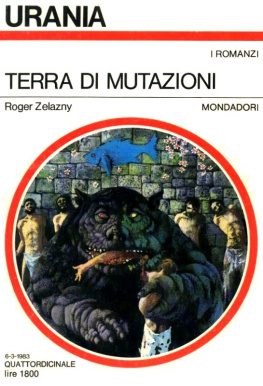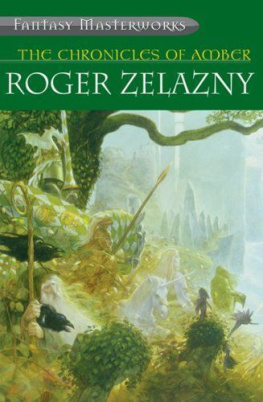LORD OF THE FANTASTIC
STORIES IN HONOR OF ROGER ZELAZNY
EDITED DY MARTIN H. GREENBERG
INTRODUCTION
FRED SABERHAGEN
It may be taken as given that any writer who succeeds in selling fiction has a large egoit takes one to negotiate that process. Roger Zelazny managed to combine that essential inner toughness with an excellent wit, and almost self-effacing courtesy, that made him a near-perfect friend, host, guest, companion on a panel or at a party. The same qualities, combined with his awesome talent, made him a near-perfect collaborator, too, in works of fiction. (Exactly what the perfect friend, collaborator, guest, etc., would be like is a philosophical question; that man or woman has not yet been observed in the flesh.)
For perhaps two decades, give or take a few years, Rogers nonfictional life and my own ran on roughly parallel tracks. We both started selling stories around the beginning of the sixties. In a few years he moved from the Middle West to Santa Fe, New Mexico, with his wife and small family. Six months later, with no idea that the Zelaznys were anywhere around, Joan and I left a different city in the Middle West and arrived in Albuquerque with our offspring.
We happily renewed acquaintance with Roger at a local convention, and thereafter saw each other with some frequency, living as we did only about sixty miles apart. My kids (one daughter, two small sons) being a few years the older, got in some practice as baby-sitters for his (two small sons, one daughter). Now and then, when our families were at the zoo or on some similar joint excursion, mine did yeoman service carrying small Zelaznys on their backs. And for years to come the Saberhagen goldfish remembered the experience of being fed by three-year-old Trent Zelazny, who served the tank an entire container of fish food at one sitting (one swimming?), enough to turn the water to a gel.
As I recall, it was during one of these family visits to our house that Roger began to tell me about a story idea that had been growing in his mind. Somehow it was decided that the idea was to be a subject of collaboration between usbut how that decision was reached I do not remember now, nor, I suspect, did I remember a day after it happened.
Let me borrow your typewriter, said Roger, and closeted himself in my office for perhaps half an hour, emerging with about ten pages that contained the heart of the book that was going to be Coils, Certainly his ten pages would have served as a salable proposal, but by that time we were after more. After a little more discussion on chapter breaks, motivation, and so on, he left those pages with me, and after putting in some labor I sent back to him in Santa Fe about fifty pages, forming a kind of narrative skeleton.
Meanwhile, publishing arrangements had been concluded with Tor Books. So Roger sat down with my fifty pages, his typewriter [This was around 1980. Not that the date would have made much difference. As far as I know, no one ever persuaded Roger that writing on a computer is easier and more efficient than making marks directly on the paper. Joan and I once talked him into buying a Macintosh, but then it just sat there. We had some fun with dueling chess programs, his computers against mine.] in his lap I have no doubt, and let flow the series of nicely polished chapters that made up the finished book. I marveled at a distance; he could always make that stage of things look easy, like a highwire artist strolling across close up under the big top.
I had never tried book-length collaboration before, and I probably never will againIve been spoiled. It was for each of us the easiest book that we had ever finished . . . maybe too easy, now that I look back at the experience. It is quite possible that both Coils and our second joint production, The Black Throne, would have been better books, and would have sold more copies, had we struggled more with the stories, and with each other, during their production.
But struggle? With Roger?
He was one of the least contentious of men, and in many ways one of the most generous. His martial art of preference was aikido, so purely a defensive system that any direct contest between practitioners is impossible.
Dwelling as we did in different cities, leading what were in many ways quite different lives, there were often long gaps between meetings. He traveled the world a great deal more than I did, but both of us were busy, and our schedules all too frequently failed to mesh. Avoiding quarrels as he did, he also disliked confrontations; and a further extension of this principle led him to steer clear of saying or doing anything that might produce an unpleasant reaction in whoever was around him, particularly friends or loved ones. This behavior made him an unfailingly pleasant companion.
But it also had a downside, when it denied people information they would have deemed of great importance, however unpalatablesuch as the fact that Roger Zelazny was dying of cancer.
When he died I was angry at him, and now, almost two years later, I think I still am, not only for leaving us all here Rogerless but for keeping the imminence of his departure such a secret. But Ill get over it. After all, he didnt do it on purpose.
* * * *
Someone someday will do a thorough biography. This is not the place to attempt even an outline of that. Rather it is the place to see what kind of reflections a spirit like Rogers can evoke in the minds of other talented writers, what sparks his talent can strike from theirs. And to hear from those others about his impact on their lives. And on the world.
Davout had himself disassembled for the return journey. He had already been torn in half, he felt: the remainder, the dumb beast still alive, did not matter. The captain had ruled, and Katrin would not be brought back. Davout did not want to spend the years between the stars in pain, confronting the gaping absence in his quarters, surrounded by the quiet sympathy of the crew.
Besides, he was no longer needed. The terraforming team had done its work, and then, but for Davout, had died.
Davout lay down on a bed of nano and let the little machines take him apart piece by piece, turn his body, his mind, and his unquenchable longing into long strings of numbers. The nanomachines crawled into his brain first, mapping, recording, and then shut down his mind piece by piece, so that he would feel no discomfort during what followed, or suffer a memory of his own body being taken apart.
Davout hoped that the nanos would shut down the pain before his consciousness failed, so that he could remember what it was like to live without the anguish that was now a part of his life, but it didnt work out that way. When his consciousness ebbed, he was aware, even to the last fading of the light, of the knife-blade of loss still buried in his heart.
The pain was there when Davout awoke, a wailing voice that cried, a pure contralto keen of agony, in his first dawning awareness. He found himself in an early-Victorian bedroom, blue-striped wallpaper, silhouettes in oval frames, silk flowers in vases. Crisp sheets, light streaming in the window. A strangershoulder-length hair, black frock coat, cravat carelessly tiedlooked at him from a gothic-revival armchair. The man held a pipe in the right hand and tamped down tobacco with the prehensile big toe of his left foot.
Im not on the Beagle, Davout said.
The man gave a grave nod. His left hand formed the mudra for . Yes.
And this isnt a virtual?
again. No.
Then something has gone wrong.
Yes. A moment, sir, if you please. The man finished tamping, slipped his foot into a waiting boot, then lit the pipe with the anachronistic lighter in his left hand. He puffed, drew in smoke, exhaled, put the lighter in his pocket, and settled back in the walnut embrace of his chair.

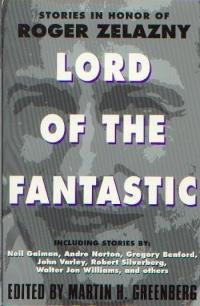


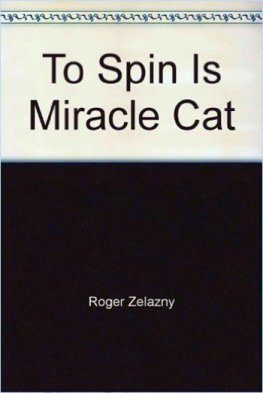
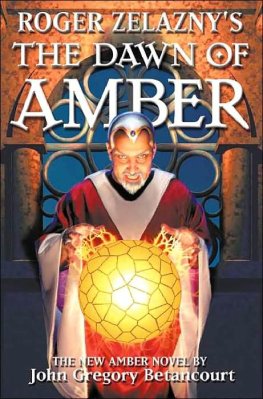
![Roger Zelazny - 24 Views of Mt. Fuji, by Hokusai [Illustrated]](/uploads/posts/book/536181/thumbs/roger-zelazny-24-views-of-mt-fuji-by-hokusai.jpg)

